About 30,000 prospective students seeking undergraduate admission into the University of Ibadan (UI) will not secure the admission for the next academic session.
The institution’s deputy vice-chancellor (DVC) Academic, Professor (Mrs) Gbemisola Oke, who disclosed this at the Stakeholders’ Forum organised by the Distance Learning Centre (DLC), said the institution could only admit 3,000 out of over 33,000 prospective students that met the requirement as set by the Joint Admissions and Matriculation Board (JAMB).
The DVC who made a case for Distance Learning to meet the needs of the people, said “if we can’t meet the needs of our people through the regular face-to-face method, let us use Open Distance Learning. Education drives growth and development and it must be at the centre for any nation to make advancement”.
At the forum where two papers, ‘Accessibility and Openness of The ODL Practice’ and ‘The Importance of Technology in ODL Practice’ by Profs. Francis Egbokhare and Abiola Lanre Awosika were delivered, Oke assured that UI would ensure that the products of its DLC “are of quality and standard in strict adherence to the mandate of the Premier University”.
In his welcome address, the director of the centre, Bayo Okunade corroborated the submission of the DVC, stressing that the solution to the problem of accessibility occasioned by inadequate space lies in Open Distance Learning (ODL), saying “it is the ultimate, whether we like it or not”.
The Professor of Political Science, who said the interaction was to fast-track the process of change being witnessed at the centre, disclosed that some advancements had been made at the centre, having attained a different level of competence.
He however maintained that “it is imperative to manage the change being encountered very well”, adding, “we must do it right in order to justify the purpose of our existence and this is why we are here to brainstorm and engage ideas on both our challenges and prospects”.
In his lecture, which drew wild applause, especially from the students, Egbokhare butressed the observation raised by the earlier speakers, when he revealed that the idea behind the proliferation of private universities as the solution to issue of accessibility to university education by Nigeria youths had failed.
This, according to him is because of low patronage, noting that only three percent of the total population of candidates seeking for admission through JAMB pick private universities, asking the government to look for ways of expanding the existing ODL facilities to be able to accommodate more candidates.
Awosika in her paper said, “technology has also made our learning world smaller so that every one can have access to ‘global classroom’. It is inclusive at all levels of education. Just as the global economy has been evolving so has learning. There has since been a strive to catch up with this evolution in the education sector of the economy”.
Hello Visitors!
Jobs and similar opportunities like this are listed daily on our platforms, and as such, it is important to take due advantage of that.
Here is how:
- Kindly Click here and add your valid email address to get updates directly to your mail. Remember to click on the confirmation link in your mail.
- Next, click here to visit our jobs listing Portal for latest Job positions.
- Alternatively, you can visit here to see top companies recruiting, or check out latest jobs in your state or latest Jobs in your industry of interest.
- Pick your area of interest.
- Read the requirements,
- Next, apply.
- Remember to always share this article with others.
- If website is down, kindly subscribe to our email notification, we will notify you once it is up.

